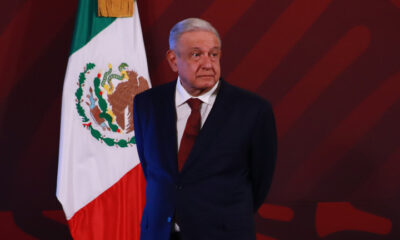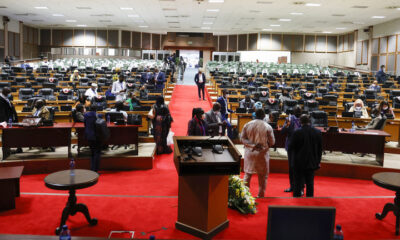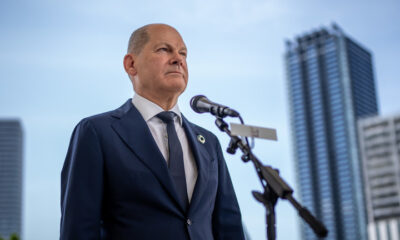OPINION
Afghan couple accuse US Marine of abducting their baby
Published
2 years agoon

The young Afghan couple raced to the airport in Kabul, clutching their baby girl close amid the chaotic withdrawal of American troops last year.
The baby had been rescued two years earlier from the rubble of a U.S. Special Forces raid that killed her parents and five siblings. After months in a U.S. military hospital, she had gone to live with her cousin and his wife, this newlywed couple. Now, the family was bound for the United States for further medical treatment, with the aid of U.S. Marine Corps attorney Joshua Mast.
When the exhausted Afghans arrived at the airport in Washington D.C. in late August 2021, Mast pulled them out of the international arrivals line and led them to an inspecting officer, according to a lawsuit they filed last month. They were surprised when Mast presented an Afghan passport for the child, the couple said. But it was the last name printed on the document that stopped them cold: Mast.
They didn’t know it, but they would soon lose their baby.
This is a story about how one U.S. Marine became fiercely determined to bring home an Afghan war orphan, and praised it as an act of Christian faith to save her. Letters, emails and documents submitted in federal filings show that he used his status in the U.S. Armed Forces, appealed to high-ranking Trump administration officials and turned to small-town courts to adopt the baby, unbeknownst to the Afghan couple raising her 7,000 miles away.
The little girl, now 3 ½ years old, is at the center of a high-stakes tangle of at least four court cases. The Afghan couple, desperate to get her back, has sued Joshua and his wife Stephanie Mast. But the Masts insist they are her legal parents and “acted admirably” to protect her. They’ve asked a federal judge to dismiss the lawsuit.
The ordeal has drawn in the U.S. departments of Defense, Justice and State, which have argued that the attempt to spirit away a citizen of another country could significantly harm military and foreign relations. It has also meant that a child who survived a violent raid, was hospitalized for months and escaped the fall of Afghanistan has had to split her short life between two families, both of which now claim her.
Five days after the Afghans arrived in the U.S., they say Mast – custody papers in hand – took her away.
The Afghan woman collapsed onto the floor and pleaded with the Marine to give her baby back. Her husband said Mast had called him “brother” for months; so he begged him to act like one, with compassion. Instead, the Afghan family claims in court papers, Mast shoved the man and stomped his foot.
That was more than a year ago. The Afghan couple hasn’t seen her since.
“After they took her, our tears never stop,” the woman told The Associated Press. “Right now, we are just dead bodies. Our hearts are broken. We have no plans for a future without her. Food has no taste and sleep gives us no rest.”
__
PULLED FROM THE RUBBLE
The story of the baby unfolds in hundreds of pages of legal filings and documents obtained under the Freedom of Information Act, as well as interviews with those involved, pieced together in an AP investigation.
In a federal lawsuit filed in September, the Afghan family accuses the Masts of false imprisonment, conspiracy, fraud and assault. The family has asked the court to shield their identity out of concerns for their relatives back in Afghanistan, and they communicated with AP on the condition of remaining anonymous.
The Masts call the Afghan family’s claims “outrageous, unmerited attacks” on their integrity. They argue in court filings that they have worked “to protect the child from physical, mental or emotional harm.” They say the Afghan couple are “not her lawful parents,” and Mast’s attorney cast doubt on whether the Afghans were even related to the baby.
“Joshua and Stephanie Mast have done nothing but ensure she receives the medical care she requires, at great personal expense and sacrifice, and provide her a loving home,” wrote the Masts’ attorneys.
The baby’s identity has been kept private, listed only as Baby L or Baby Doe. The Afghan couple had given the baby an Afghan name; the Masts gave her an American one.
Originally from Florida, Joshua Mast married his wife Stephanie and attended Liberty University, an evangelical Christian college in Lynchburg, Virginia. He graduated in 2008, and got his law degree there in 2014.
In 2019, they were living with their sons in Palmyra, a small rural Virginia town, when Joshua Mast was sent on a temporary assignment to Afghanistan. Mast, then a captain in the U.S. Marine Corps, was a military lawyer for the federal Center for Law and Military Operations. The U.S. Marines declined to comment publicly, along with other federal officials.
That September in 2019 was one of the deadliest months of the entire U.S. occupation in Afghanistan, with more than 110 civilians killed in the first week alone.
On Sept. 6, 2019, the U.S. attacked a remote compound.
No details about this event are publicly available, but in court documents Mast claims that classified reports show the U.S. government “sent helicopters full of special operators to capture or kill” a foreign fighter. Mast said that rather than surrender, a man detonated a suicide vest; five of his six children in the room were killed, and their mother was shot to death while resisting arrest.
Sehla Ashai and Maya Eckstein, attorneys for the Afghan couple, dispute Mast’s account. They say the baby’s parents were actually farmers, unaffiliated with any terrorist group. And they described the event as a tragedy that left two innocent civilians and five of their children dead.
Both sides agree that when the dust settled, U.S. troops pulled the badly injured infant from the rubble. The baby had a fractured skull, broken leg and serious burns.
She was about 2 months old.
Mast called the baby a “victim of terrorism.” His attorney said she “miraculously survived.”
__
“DO THE RIGHT THING”
The baby was rushed to a military hospital, where she was placed in the care of the Defense Department.
The International Committee of the Red Cross told AP that they began searching for her family with the Afghan government, often a plodding process in rural parts of the country where record-keeping is scant. At first, they didn’t even know the baby’s name.
Meanwhile, Mast said, he was “aggressively” advocating to get her to the U.S. Over several months, he wrote to then-Vice President Mike Pence’s office, according to exhibits filed in court. He said his colleagues in the military tried to talk to President Donald Trump about the baby during a Thanksgiving visit to Bagram Airfield. Mast also said he made four requests over two weeks to then-White House Chief of Staff Mick Mulvaney, asking for help to medically evacuate the baby “to be treated in a safe environment.”
The Masts were represented by Joshua’s brother Richard Mast, an attorney with the conservative Christian legal group Liberty Counsel, which says it is not involved in this case. None of the Masts responded to repeated requests for interviews.
In emails to military officials, Mast alleged that Pence told the U.S. Embassy in Kabul to “make every effort” to get her to the United States. Mast signed his emails with a Bible verse: “’Live for an Audience of one, for we must all appear before the judgment seat of Christ.”
Pence’s spokesman, Marc Short, did not respond to requests for comment.
The U.S. Embassy never heard from Pence’s office, said a Department of State official, who requested anonymity because they did not have permission to speak publicly about the situation. But they did begin getting highly unusual inquiries about the possibility of sending the baby to the U.S. The diplomats were rattled by the suggestion that the U.S. could just take her away; they believed the baby belonged to Afghanistan.
“I was aware that it may not be smooth sailing ahead, but that just made me more determined to do the right thing,” the State Department official said.
About six weeks after the baby was rescued, the U.S. Embassy called for a meeting, attended by representatives of the Red Cross, the Afghan government and the American military, including Mast. The State Department wanted to make sure everyone understood its position: Under international humanitarian law, the U.S. was obliged to do everything possible to reunite the baby with her next of kin.
At the meeting, Mast asked about adoption, the State Department official said. Attendees from Afghanistan’s Ministry of Labor and Social Affairs explained that by Afghan law and custom, they had to place the baby with her biological family. If that did not work, the Afghan Children’s Court would determine a proper guardian.
The American concept of adoption doesn’t even exist in Afghanistan. Under Islamic law, a child’s bloodline cannot be severed and their heritage is sacred. Instead of adoption, a guardianship system called kafala allows Muslims to take in orphans and raise them as family, without relinquishing the child’s name or bloodline.
American adoptions from Afghanistan are rare and only possible for Muslim-American families of Afghan descent. The State Department recognizes 14 American adoptions from Afghanistan over the past decade, none in the past two years.
Yet two days after the embassy meeting, a letter was sent to U.S. officials in Kabul from Kimberley Motley, a near-celebrity American attorney in Afghanistan, the State Department official said. Motley wrote that she was representing an unnamed concerned American citizen who wished to adopt this baby. Motley declined to be interviewed by the AP.
Mast also continued his appeals to American politicians. The U.S. Embassy began hearing from Congressional staffers about the baby, and diplomats met with a military general, the official said.
The general in turn put a “gag order” on military personnel about the baby and said “no one was to advocate on her behalf,” Mast wrote in a legal filing.
But he wasn’t ready to give up.
___
HALFWAY AROUND THE WORLD
The Masts searched for a solution halfway around the world — in rural Fluvanna County, Virginia, where they lived.
They petitioned the local Juvenile and Domestic Relations Court, describing the baby as a “stateless minor recovered off the battlefield.” In early November 2019, a judge granted them legal custody. The name of this judge is not publicly available because juvenile records are sealed in Virginia.
A few days later, a certificate of foreign birth listed Joshua and Stephanie Mast as parents.
The custody order was based on the Masts’ assertion that the Afghan government — specifically now-deposed President Ashraf Ghani — intended to waive jurisdiction over the child “in a matter of days,” according to a hearing transcript. The waiver never arrived.
In an email to AP, Ghani’s former deputy chief of staff Suhrob Ahmad said there is “no record of this alleged statement of waiver of Afghan jurisdiction.” Ahmad said he and the head of the Administrative Office of the President do not remember any such request going through the court system as required.
The U.S. Embassy heard that Mast was granted custody. Military lawyers assured them that the Marine was just preparing in case Afghanistan waived jurisdiction, but would not interfere with the search for the baby’s family, according to the State Department official.
Yet all along they planned to adopt the baby, according to records obtained from the state of Virginia under a Freedom of Information Act request. Richard Mast wrote the Attorney General’s office in November 2019 that the Masts “will file for adoption as soon as statutorily possible.”
In the meantime, Joshua Mast enrolled the baby in the Defense Department health care system, made an appointment at a U.S. International Adoption Clinic and asked to have her evacuated.
Then came a surprise: The Red Cross said they’d found her family. She was about five months old.
In late 2019, Afghan officials told the U.S. Embassy that the baby’s paternal uncle had been identified, and he decided his son and daughter-in-law were best suited to take her, according to court records. They were young, educated newlyweds with no children yet of their own, and lived in a city with access to hospitals.
The young man worked in a medical office and ran a co-ed school, which is unusual in Afghanistan. His wife graduated from high school at the top of her class, and is fluent in three languages, including English. They had married for love, unlike many Afghans in arranged marriages.
Mast expressed doubts about the newly-found uncle, describing him in court records as “an anonymous person of unknown nationality” and claiming that turning the baby over to him was “inherently dangerous.” He asked the Red Cross to put him in touch, but they refused.
In emails to a U.S. military office requesting evacuation, Mast alleged that he read more than 150 pages of classified documents, and concluded the child was a “stateless minor.” Mast believed she was the daughter of transient terrorists who are citizens of no country, his attorney said. He also speculated that if reunited with her family, she could be made a child soldier or a suicide bomber, sold into sex trafficking, hit in a U.S. military strike, or stoned for being a girl.
But Afghanistan did not waver: the child was a citizen of their country.
Mast’s attorney sent the U.S. Embassy a “cease and desist” letter warning them not to hand the baby over, according to the State Department official. But on February 26, 2020, the Masts learned that the U.S. was preparing to put the baby, now nearly 8 months old, on a plane early the following morning to join her family in another Afghan city.
The Masts, represented by Richard Mast, sued the secretaries of Defense and State in a federal court in Virginia, asking for an emergency restraining order to stop them. The Masts claimed they were the baby’s “lawful permanent legal guardians.”
Within hours, four federal attorneys — two from the Justice Department and two from the U.S. Attorney’s Office — were on the phone, and Richard Mast was in Federal Judge Norman Moon’s office.
Richard Mast said the baby should not be “condemned to suffer.” He complained that the Afghan government had not conducted DNA testing to confirm the family they found was truly related to the child.
But the Justice Department attorneys said they had no right to mandate how the Afghan government vets the family, and that the Red Cross — which has reunited relatives in war zones for more than a century — had confirmed it was done properly. Further, the federal government’s attorneys described the Masts’ custody documents from state court as “unlawful,” “deeply flawed and incorrect,” and “issued on a false premise that has never happened” — that Afghanistan would waive jurisdiction.
Judge Moon asked Richard Mast: “Your client is not asking to adopt the child?”
“No sir,” Mast responded. “He wants to get her medical treatment in the United States.”
Justice Department attorneys argued that the United States must meet its international obligations. Attorney Alexander Haas put it simply: Taking another country’s citizen to the United States “would have potentially profound implications on our military and foreign affairs interests.”
Judge Moon ruled against the Masts, and the baby stayed in Afghanistan.
The next day, she was united with her biological family. The Afghan couple wept with joy.
“We didn’t think she would come back to her family alive,” said the young Afghan man. “It was the best day of our lives. After a long time, she had a chance to have a family again.”
___
AN EXTRA MEASURE OF TENDERNESS
As the months passed in her new home in Afghanistan, the girl loved getting henna painted on her hands and dressing up in new clothes, the Afghan couple said. She always wanted to do her new mother’s makeup, or brush her hair.
“She knew about Allah, about clothes, about the names of food,” the woman wrote.
The couple cared for her as if she was their own daughter, but with an extra measure of tenderness because of the unimaginable tragedy she’d already suffered.
“We never wanted her to feel she couldn’t have something she wanted,” said the young man.
Meanwhile, Mast continued to worry that the child was “in an objectively dangerous situation,” Richard Mast wrote in court documents. The Masts asked Kimberley Motley, the attorney, to track down the family, saying he wanted to get the child medical treatment in the U.S, Motley said in court records.
Motley contacted the Afghan family in March 2020, about a week after the baby was placed in her new home. Motley is named as a defendant in their lawsuit, but her attorney, Michael Hoernlein, told AP the claims against her are “meritless.” In court documents, Motley’s attorneys describe her role as professional and above-board, and asked that the claims against her be dismissed.
Motley had originally gone to Afghanistan in 2008 under an American-funded initiative to train local lawyers. She stayed, largely representing foreigners charged with crimes. She took on high-profile human rights cases, gave a TED Talk and wrote a book.
Over the course of a year, Motley called for updates about the child and occasionally asked for photos. In July, around the baby’s first birthday, the couple sent Motley a snapshot of the child in swim trunks, smiling and splashing in a wading pool.
At the same time, the Masts’ adoption case was still winding through the court system in Fluvanna County, Virginia. In December 2020, the state court granted the Masts a final adoption order based on the finding that the child “remains up to this point in time an orphaned, undocumented, stateless minor,” according to a federal lawsuit. Fluvanna County Circuit Court Presiding Judge Richard E. Moore did not respond to repeated requests for clarity on how the cases progressed.
International adoption lawyers were baffled.
“If you have relatives there who are saying, ‘no, no, no, we want our daughter, we want our little girl,’ it’s over,” said Irene Steffas, an adoption and immigration attorney. “There is no way the U.S. is going to get into a match with another country when it comes to a child that’s a citizen of that country.”
Karen Law, a Virginia attorney who specializes in international adoption, said state law requires an accredited agency to visit three times over six months and compile a report before an adoption can be finalized. The child must be present for the visits — but this baby was thousands of miles away.
On July 10, 2021, around the baby’s second birthday, Motley facilitated the first phone call between the Afghan couple and Joshua Mast, with the aid translator Ahmad Osmani, a Baptist pastor of Afghan descent. Mast told the Afghan couple that unless they sent the child to the United States for medical care, she could “be blind, brain damaged, and/or permanently physically disabled.”
But the Afghan man now raising her, who had worked in the medical field, did not think her burn scars, a leg injury and mysterious allergic reactions amounted to a life-altering condition in the way Mast described. The couple declined sending the baby to the United States.
The woman was pregnant, and worried about the risk of such a long flight. They said they asked Mast: Could they take the baby to Pakistan or India for treatment instead?
The answer was no, their lawsuit says. The conversations continued for months. Osmani, the translator, vouched for the Masts and described them as kind and trustworthy, according to the lawsuit, which names him as a defendant.
Osmani did not respond to requests for comment. He asked a federal judge to throw out the lawsuit, and said he never deceived anyone. He was only a “mere translator.”
His attorneys wrote: “No good deed goes unpunished.”
__
“LIVING IN A DARK JAIL”
In late summer 2021, the Taliban seized power in Afghanistan. Mast said he contacted the family to bring the baby to the U.S. “before the country collapsed.” He said he was “extremely concerned that they may not get another chance.” The couple agreed.
Mast applied for special visas for the Afghan family and for relatives of Osmani, the translator, according to court records. They characterized the Afghan couple as an escort for a “U.S. military dependent” — the baby.
In an email to U.S. officials filed in court, Mast wrote that Osmani was “very instrumental to helping a U.S. Marine…adopt an Afghan child.”
Soon, the Afghan family began their days-long journey to the U.S. Joshua Mast told them to say he was their lawyer.
“If anyone asks to talk about your documents, show them this text: I am Major Joshua Mast, USMC. I am a Judge Advocate…” Mast texted them detailed directions for how to deal with U.S. authorities, their lawsuit says.
When the family arrived in Germany for a stopover, Joshua Mast and his wife greeted them at the air force base. It was the first time they had met in person.
In Germany, the Masts visited the Afghan family’s room three times to try to get the baby to travel separately with them, “insisting that it would be easier for the toddler to enter the United States that way,” the Afghan couple recalled in their lawsuit. They refused to let the girl out of their sight.
When the Afghans finally landed in the United States, they began explaining that the child was too young to have Afghan documents. That’s when they claim Joshua Mast pulled out an Afghan passport.
Inside was the same photo of the child in the wading pool, but altered to change the background, add a shirt and smooth her hair. Mast told the Afghans to “keep quiet” about having his name on her passport, their lawsuit alleges, so it would be easier to get medical care.
The Afghan couple asked to be taken to Fort Pickett Army National Guard base, a location specified by Mast, according to the lawsuit. Thousands of Afghan refugees were temporarily housed there.
Soon after, they said, soldiers came to their room and told them they were moving. A strange woman sat in the back of the van next to a car seat, according to court records, and the baby fussed as she buckled her in.
The van pulled up to a building they didn’t recognize, where a woman who called herself a social worker said the Masts were the girl’s legal guardians. Confused and frightened, the child cried and the couple begged.
But it did no good. Mast took the baby to his car, where his wife was waiting, the lawsuit says.
They had lost her.
In their heavily redacted response to the lawsuit, the Masts acknowledge they “took custody” of the child; they said their adoption order was valid and they did nothing wrong.
Richard Mast is also named as a defendant in the Afghan family’s lawsuit. He wrote in legal documents that his brother’s adoption of the child was “selfless;” it saved both the child, and the Afghan family fighting to get her back, “from the evils of life under the Taliban.”
The Afghan couple believed that their baby was stolen, and they immediately sought help at Fort Pickett to get her back.
“But the playing field was not level,” their attorney, Ashai, told the AP. The couple “were forced to navigate a complex and confusing system in a foreign country in which they had just arrived, after having survived the greatest trauma of their lives.”
Meanwhile, the couple says in court documents, Osmani warned them not to contact a lawyer or the authorities, and suggested that Mast might give them the baby back if they dealt directly with him.
And so they tried to maintain contact with Mast. They were also scared of him. If he could abduct their child in broad daylight, they worried he might hurt them too, their lawyers wrote in legal filings.
The Afghan woman plunged into a deep depression and, despite being nine months pregnant, stopped eating and drinking. She could not sleep. Her husband was afraid to leave her alone.
“Since we have come to America, we have not felt happiness for even one day,” the Afghan man told the AP. “We feel like we are living in a dark jail.”
His wife gave birth to a girl on October 1, 2021. The young mother’s grief became overwhelming. A month later, she considered suicide and was hospitalized.
Soon the couple sought legal help; by December 2021, the Afghan couple had asked the Fluvanna judge to reverse the adoption. But those proceedings, almost one year in, have been opaque and slow.
On Feb. 27, 2022, when the Afghan baby was 2 ½ years old, the Masts traveled to the Mennonite Christian Assembly in Fredericksburg, Ohio, to share their joy during a special church service. In a video advertising the event called “Walking in Faith,” the pastor apologized to congregants that it would not be online, because the Marine would share “very confidential, classified information.”
“Unforeseen events gave the couple an unexpected opportunity to stand up to protect innocent life,” read the program flyer. “Come hear how God’s mighty hand allowed for a remarkable deliverance.”
Pastor John Risner told the AP that the Masts had requested the service be confidential, and he didn’t want to betray their trust by disclosing any details.
All he would say is that their story is “amazing.”
__
NO HAPPINESS HERE
The fate of the Afghan child is now being debated in secret proceedings in a locked courtroom in the village of Palmyra, Virginia, home to about 100 people.
Earlier this month, Joshua Mast arrived at the Fluvanna County courthouse along with his wife and his brother Richard. Mast was dressed in his starched Marine uniform, holding his white and gold hat in his hand. The hearing stretched on for roughly eight hours.
The proceedings have been completely shielded from public view, mandated by presiding Judge Moore. The AP was not allowed inside the courtroom. Court clerk Tristana Treadway refused to provide even the docket number, saying she could “neither confirm nor deny” the case existed at all.
More than a dozen lawyers streamed into the courthouse, carting boxes of evidence, and each said they were forbidden from speaking.
Mast remains an active duty Marine, and has since been promoted to major. He now lives with his family in North Carolina. The Afghan toddler has been with them for more than a year.
In Texas, the Afghan couple continues to grieve the loss of the child. The baby the woman gave birth to shortly after arriving in the U.S. just turned 1. The young mother had planned to raise the girls as sisters.
But they’ve never met.
“There is nothing to celebrate without her. There is no happiness here,” the Afghan man said. “We are counting the moments and days until she will come home.”
OPINION
Disgraced ex-PM Liz Truss seeks to ruin any hopes for normal UK-China ties
Published
1 year agoon
May 18, 2023
The former premier’s Taiwan trip is nothing but a provocation for Beijing to lash out at London, sinking any constructive dialogue
Liz Truss will always be remembered as a disastrous prime minister who spent only a month in office and was outlasted by a head of lettuce.
Her disastrous budget plans sent shudders through the UK economy, eliciting criticism from the British people, MPs and foreign leaders alike. Her ideology-driven political decisions found little sympathy with the public, which repaid her with abysmal approval ratings.
You’d think someone like that would have little credibility as a political adviser, but that apparently isn’t the case. Taiwan, which frequently pays washed-up Western right-wing fanatics to come and visit them as a political stunt, invited Liz Truss to Taipei on Tuesday and Wednesday.
Truss then gave a hawkish speech where she called for an end to all cooperation and dialogue with Beijing and the preparation of Russia-style sanctions in the event of a Taiwan conflict. She also repeated her suggestion of an “Economic NATO” – despite a track record that makes her the last person you’d want to listen to for economic advice.
‘Economic NATO’ needed to counter China – Truss
Since her brief stay in Downing Street, she has rebranded herself as a full-time anti-China hawk, and now uses her party position and credentials as a former prime minister to try to undermine her successor’s attempts to carefully edge back towards engagement with China. Truss was always a fantasist, a pro-Brexit zealot who embraced a confrontational stance during her time as foreign secretary.
However, as you can imagine, all you need to do to reinvent yourself these days is to become a China basher. It doesn’t matter how much of a joke you otherwise might be. Hence, the UK media made sure that her stay and words in Taiwan were given widespread coverage without the context of her political failures. The UK government has already distanced itself from her trip – a fact that Beijing should take careful notice of (and no doubt has).
The British Conservative Party has always been rife with that sort of factionalism. While the opposition Labour Party tends to hard-line suppress the more ideological wing of its MPs (hence the purge of the left-wing Corbynite faction), Tory ideologues have long held power as a “disruptive” force on the government itself, undermining its foreign policy. It’s a fracture which emerged during the Margaret Thatcher era, where following the breakdown of the “post-war consensus” of economic pragmatism, ideology gained ascendency in the party and soon manifested into Euroscepticism.
This tug of war lasted 30 years, making it harder for Conservative prime ministers to maintain a working relationship with the EU, and eventually culminating in Brexit itself. Once that was out of the way, these ideologues found a new target: China. While Truss has opportunistically jumped on this bandwagon, former arch-Brexiter Iain Duncan Smith had already made himself the UK’s Sinophobe-in-chief. Their common goal is simply to undermine stable ties with Beijing and provoke conflict by spurring on backbench rebellions, making them a challenge for the government to handle.
Taiwan predicts timeline for conflict with China
Consequently, while Truss may be a national laughingstock thanks to her disastrous tenure as prime minister, this new role she is taking on enables her to cause disruption on this issue. Taiwan, of course, knows this, because its entire foreign policy is premised on trying to undermine the ties of other countries’ relationships with Beijing by spending large amounts of money on inviting figures such as Truss. The timing of the trip was deliberate, coming immediately after the British foreign secretary’s engagement with a senior Chinese official following the coronation of King Charles III.
Taipei hopes that Beijing’s backlash over the Truss visit will target the UK government as a whole and punish the country. China has a record for being abrasive like this, having done so with the Czech Republic in the past and not winning any friends there as a result. If Truss is therefore allowed to dictate the flow of UK-China relations, she wins. Besides her, the UK has never been provocative on Taiwan at a senior level such as with former Speaker of the House Nancy Pelosi’s visit last year for the US.
Thus, rather than causing a crisis, China should wait until the upcoming Taiwan elections take place and hope that the more pro-China Kuomintang Party (KMT), which once governed the whole country, will take power and stabilize cross-strait ties again. The Democratic Progressive Party (DPP) thrives off creating crises, as does the US with its military deployments, and amidst it all there is no intention for cool heads to prevail. While Pelosi was a blatant violation and huge provocation of the One China policy and US commitment to it, the Truss trip is an opportunistic PR stunt by a washed-up has-been who almost ran her country into the ground in a month. Ignore, move on and forget.
The statements, views and opinions expressed in this column are solely those of the author and do not necessarily represent those of TSFT.
You can share this story on social media:
PLEASANT MUSIC FOR YOUR CAFE, BAR, RESTAURANT, SWEET SHOP, HOME
SUITABLE MUSIC FOR YOGA LOVERS
OPINION
India facing challenge to steer SCO agenda away from Western-dominated frameworks
Published
1 year agoon
May 17, 2023
The Shanghai Cooperation Organisation is looking at ways to address the most pressing global issues without being a disruptive influence
The upcoming Shanghai Cooperation Organization (SCO) summit promises to be a watershed moment in the bloc’s history, coming amid unprecedented global challenges and new, emergent tensions.
While the SCO Foreign Ministers meeting, which took place on May 4 and 5, was tasked with preparing the agenda for the July 3-4 summit in New Delhi, there is still much work to do to ensure that India’s chairmanship will be a success.
The West has broken virtually all links with Russia because of the Ukraine conflict. Western sanctions against Russia are unprecedented in scope, carrying significant ramifications also for the developing world, including the economic disruptions caused by the weaponization of the US dollar. The European security architecture is in tatters. For the West to seek Russia’s strategic defeat while the country possesses formidable military and material resources makes no sense. Risking a potential nuclear conflict in particular is totally irresponsible.
The European Union has lost its already limited capacity to play an independent role, especially with Germany losing clout and Brussels appropriating more power. The doors of dialogue and diplomacy are being kept closed as NATO seeks military advantage over Russia, and uses Ukraine as a proxy.
At the other end of Eurasia, US-China tensions are rising over Taiwan, regional maritime disputes, strengthening of US-centered regional alliances and NATO overtures to Japan and South Korea. The US and the EU are warning China against supplying lethal arms to Russia under pain of sanctions, even as they seek China’s support in persuading Russia to end its military intervention in Ukraine, and this in the background of the high-level dialogue between the US and China having virtually broken down.
Can Eurasia’s rising political bloc show a united front against the West’s encroachment?
Both Russia and China, the principal pillars of the SCO, are at loggerheads with the West to different degrees, and the summit agenda will inevitably reflect this reality. The SCO represents a building block of multipolarity within the global system at the political, economic and security levels, a goal reiterated at the Foreign Ministers’ meeting.
While the other SCO members have robust links to both Russia and China, their connections with India are not as strong, despite mutual goodwill and shared interests. This is largely due to a lack of contiguity and direct access to Central Asia. With Iran and Belarus joining as full members, the SCO will achieve greater Eurasian depth. Both of these countries have been politically and economically targeted by the West. The SCO Foreign Ministers meeting also agreed on May 5 to grant dialogue partner status to Kuwait, the Maldives, Myanmar and the UAE, in addition to the nine existing dialogue partners. The growing interest demonstrates the appeal of the SCO as a grouping of non-Western countries that provide an alternative platform for nations to pursue their interests outside the Western-dominated international system.
Association with the SCO increases their margin to maneuver, primarily at the political and economic levels. Diplomatic support, hedging against Western sanctions, access to non-Western development banks, benefits from connectivity projects and infrastructure development, cooperation against terrorism, extremism and separatism, are obvious advantages.
India has taken its current presidency of the SCO seriously, organizing and hosting more than 100 meetings and events, including 15 ministerial level meetings. Indian Foreign Minister Subrahmanyam Jaishankar has also stressed the great importance for India of developing multifaceted cooperation. He introduced the term ‘SECURE’ SCO on the basis of Security, Economic Development, Connectivity, Unity, Respect of sovereignty and territorial integrity, and Environmental protection.
As SCO Chair, India initiated an unprecedented engagement with the organization’s Observers and Dialogue Partners by inviting them to participate in more than 14 socio-cultural events. Many of the events hosted by India occurred for the first time in the framework of the SCO, such as the Millet Food Festival, Film Festival, Cultural Festival, the Tourism Mart, and Conference on Shared Buddhist Heritage.
Moscow Region representatives conduct roadshows to entice Delhi and Mumbai investors
Jaishankar noted that as a result of the Covid-19 pandemic and geopolitical upheavals, global supply chains had been disrupted, leading to a serious impact on delivering energy, food, and fertilizers to developing nations. He viewed these challenges as an opportunity for SCO members to address them collaboratively, noting that with more than 40% of the world’s population within the SCO, its collective decisions would surely have a global impact.
Additionally, Jaishankar highlighted the unabated menace of terrorism, and that combating it was one of the original mandates of the SCO. He drew attention to the unfolding situation in Afghanistan where the immediate priorities included providing humanitarian assistance, ensuring a truly inclusive and representative government, combating terrorism and drug trafficking and preserving the rights of women, children and minorities. This was echoed by the Chinese foreign minister.
India expressed its willingness to share its expertise and experience in the field of startups having helped cultivate over 70,000, more than 100 of which were ‘unicorns’. Last year, it proposed the creation of a Startups and Innovation working groups as well as one focused on traditional medicines, and the SCO meeting approved plans to operationalize these initiatives.
India believes that the SCO should look at reform and modernization to keep the organization relevant in a rapidly transforming world, and noted that discussions on these issues had already commenced. It also sought support for its long-standing demand to make English the SCO’s third official language, as this would enable a deeper engagement with English-speaking members and would take the SCO’s work to a global audience.
India also proposed the New Delhi Declaration as an SCO Summit Declaration at the meeting, as well as four other thematic joint statements on cooperation in de-radicalization strategies, promotion of millets, sustainable lifestyles to address climate change and digital transformation. India sought support for a timely finalization of these documents for approval at the SCO Summit.
Indian delegation wraps up successful business tour in Russia
According to Chinese Foreign Minister Qin Gang, all participating parties considered the SCO as an important platform for joint combat against terrorism, separatism, drug trafficking, as well as cyber crimes. All favored more cooperation in such fields as transportation, energy, finance, investment, trade, the digital economy, regional connectivity, deeper cultural and people-to-people exchanges, environmental protection, climate change, sustainable development, and SCO’s strengthened cooperation with the United Nations and BRICS countries.
The meeting also offered the gathered foreign ministers an opportunity for intense bilateral meetings. For example, Russian Foreign Minister Lavrov met his Chinese counterpart to discuss the implementation of agreements reached between Vladimir Putin and Xi Jinping in March.
The SCO continues to enlarge its footprint, widen its agenda, and carve out a non-Western space in the international system, but some key points of friction remain between members especially China and India. The two countries are currently embroiled in a border dispute that has yet to be settled. Additionally, India stands in opposition to China’s Belt and Road Initiative due to India’s concerns about connected sovereignty issues.
The other, less important fault line, is India-Pakistan relations. Pakistan’s Foreign Minister Bhutto Zardari did not help matters by making indirect jibes at India during his speech at the SCO meeting and further criticism of New Delhi in his interviews to the media. His comments elicited a sharp response by the Indian Foreign Minister, but only after the SCO meeting was completed. Pakistan is currently in the throes of a major internal crisis, which may affect its participation in the SCO summit. However, India-Pakistan differences are not germane to the SCO’s growing stature. Far more important is the Russia-India-China triangle.
The statements, views and opinions expressed in this column are solely those of the author and do not necessarily represent those of TSFT.
You can share this story on social media:
PLEASANT MUSIC FOR YOUR CAFE, BAR, RESTAURANT, SWEET SHOP, HOME
SUITABLE MUSIC FOR YOGA LOVERS

Rome is considering leaving the Belt and Road Initiative in a move which will place virtue signaling to other Western states above its own interests
Italy’s membership of China’s Belt and Road Initiative (BRI) is up for renewal at the end of this year, and Western media outlets are speculating that Rome may choose to leave the pact.
Italy became the first and only G7 nation to join China’s multi-billion-dollar infrastructure vision, signing a memorandum of understanding (MoU) just before a tidal wave of anti-China sentiment was unleashed on the world. Indeed, the country’s leadership was in a very different place then, with Italy being led by Giuseppe Conte of the Five Star Movement, whose populism faulted the Euro-Atlantic establishment for decimating the Italian economy through the 2008 debt crisis and the brutal austerity measures which followed. It is little wonder that Italy had decided to look eastwards.
Even 15 years on from the events of 2008, Italy’s economy still has not fully recovered. It was worth $2.4 trillion at the end of that year, but is only at $2.1 trillion now, and barely growing at all. New and concurrent economic crises have taken a toll. Italy’s current leadership no longer believes all roads lead to Rome, let alone to China’s modern-day Silk Road – rather, they lead to Washington. As pressure on the country has grown, its successive leaders, Mario Draghi and Giorgia Meloni, have sought to reset its foreign policy back to transatlantic-oriented goals, ending its rebellion against the establishment and thus contemplating quitting China’s grand initiative.
Italy may exit ‘New Silk Road’ – FT
Oddly enough, the truth remains that it is the EU and US that stand as the biggest threat to Italy’s prosperity, not China. While dumping the BRI will receive plaudits from the US-dominated commentary circles in these countries, the reality is that they offer no alternative, no plans, and no incentives to make Italy a wealthier country. It is the “sick man” of the G7, an advanced economy that has increasingly lost its competitiveness, but also one that has been thrust into decline by being a southern EU country and a net loser of Eurozone policies.
It is precisely because of the economic upheavals that the country has faced over the past 15 years and widespread political dissatisfaction, that radical and populist politics have gained ground. China was rightfully seen as an alternative, a country that could rapidly expand Italy’s exports and invest in crumbling public infrastructure. However, this has quickly become politically incorrect. Italy’s leaders argue that BRI participation has been a waste of time. However, the reality is that when Eurocrat Mario Draghi came to office, he sought to reset Italy’s foreign policy and began using new “golden powers” to veto and cancel Chinese investments in Italy on a large scale. In 2021 alone, he blocked three Chinese takeovers, including a seed and vegetable producer.
Following Draghi, Giorgia Meloni, despite her outward populism, has been even more prone to pledging Rome’s loyalty to the transatlantic cause, having decided to become vocal in support of Ukraine in its conflict with Russia and even visit Kiev. At this stage, it is very little surprise that her country is contemplating canceling participation in the BRI, something which can score political points and help dispel doubts about her loyalty to Brussels and Washington. Predictably, the mainstream media narrative readily depicts the BRI in predatory and malign terms, ignoring the obvious empirical truth that it is the EU that has saddled Italy with a national debt larger than its GDP, and not China. Of course, there is no alternative scheme or plan for Italy on offer should it leave the BRI, meaning it is cutting its nose off to spite its face.
EU defenseless against China – Berlusconi
By forfeiting its BRI membership, Italy will undoubtedly lose the opportunity to massively enhance its trade competitiveness, namely by opting out of projects such as Chinese-owned ports and railway links. As an example of this, Greece, to the southeast, has positioned itself as a “gateway to Europe” through Chinese ownership of Pireaus port and its connecting railways, which allows cargo to go up through the Suez Canal into the Mediterranean, into the port and then across Europe. Italy could have competed for a share of this, but it has chosen not to, and it’s not like it will be selling anything additional to the US with its protectionist “America first” policies, is it?
In doing so, Italy has chosen to stop being a leader pursuing its own path in the world to better strengthen its global clout, but instead to be a follower, to play second fiddle to the transatlantic establishment which doesn’t see it as a particularly prominent partner to begin with. Italy joined the BRI precisely because it was sick of being a “rule taker” from Brussels, in a similar vein to what Greece has experienced. Now it appears happy again to hold up the political orthodoxy of the elitist, US-led G7. In doing so, it can kiss goodbye any hopes of becoming a powerful and influential country again anytime soon. Italy is admired mostly for its past, as opposed to what it offers to the world presently, and if its current leadership has its way, that will likely remain the case.
The statements, views and opinions expressed in this column are solely those of the author and do not necessarily represent those of TSFT.
You can share this story on social media:
PLEASANT MUSIC FOR YOUR CAFE, BAR, RESTAURANT, SWEET SHOP, HOME
SUITABLE MUSIC FOR YOGA LOVERS



Global debt balloons to record highs

German military to sell tons of toilet paper

First female Saudi astronaut heads to space

Nigeria takes step to combat fuel shortages

US will default if debt deal fails – treasury secretary

Village People demand Trump stop using their music

Hollywood star pulls out of hosting awards show amid strike

Rock icon slams German authorities

Agatha Christie novels chopped by ‘sensitivity readers’ – media

Marvel star back in training after breaking over 30 bones

Turkish minister escapes fire blast (VIDEO)

Trump savages pop star’s Super Bowl performance

Alec Baldwin sued by Ukrainian family of slain cinematographer

Duran Duran stumbles, Dolly Parton rolls into Rock Hall

Sweden probes possible plot behind Russian pipeline leaks

FINANCE


Global debt balloons to record highs
It’s now $45 trillion higher than its pre-pandemic level and is expected to continue growing rapidly, a top trade body...


Nigeria takes step to combat fuel shortages
The West African country has built a giant oil refinery to cover domestic demand Nigeria will commission its new Dangote...


US will default if debt deal fails – treasury secretary
The current borrowing limit is a constraint on Washington’s ability to meet its obligations, Janet Yellen insists America’s chances of...


Facebook parent Meta fined €1.2 billion by Irish watchdog
The American tech company has been accused of violating EU data privacy rules US tech giant Meta has been hit...


UK’s business with sanctioned country booming
Trade between Britain and Iran has reached the highest level in a decade, according to official data, apparently having been...

POLITICS


Erdogan election defeat would be ‘revenge’ – Syrian Kurds
The YPG claims the Turkish president failing to win another term would be payback for Ankara’s counter-terrorism operations in Syria...


Chinese special envoy meets with Zelensky
Li Hui visited Kiev to share Beijing’s views on a political settlement to the Ukraine crisis Ukrainian President Vladimir Zelensky...


Pakistan’s top court orders release of former PM Imran Khan
Pakistan’s Supreme Court has ordered the release of former prime minister Imran Khan, whose arrest earlier this week triggered deadly...


Kamala Harris to run AI taskforce
The US vice president will ask AI execs to evaluate the safety and fairness of their models US Vice President...


Most Americans want to move on from Biden and Trump – poll
70% of respondents said the incumbent shouldn’t bid for office in 2024, with that figure 60% for the Republican former...

OPINION


Disgraced ex-PM Liz Truss seeks to ruin any hopes for normal UK-China ties
The former premier’s Taiwan trip is nothing but a provocation for Beijing to lash out at London, sinking any constructive...


India facing challenge to steer SCO agenda away from Western-dominated frameworks
The Shanghai Cooperation Organisation is looking at ways to address the most pressing global issues without being a disruptive influence...


China isn’t the biggest threat to Italy’s prosperity
Rome is considering leaving the Belt and Road Initiative in a move which will place virtue signaling to other Western...


Meet the Czech lawyer who rallies thousands to shake up the EU establishment
In mid-April, a fledgling political party that recently formed in the Czech Republic called Pravo Respekt Odbornost (Law Respect Expertise;...


UK shows signs of good will to China, but it’s not the one calling the shots in this relationship
The British foreign secretary says antagonizing Beijing goes against London’s ‘national interests’, but Washington has other ideas British Foreign Secretary...

LIFE


conic Smiths bassist dies aged 59
The bassist with legendary English rock band The Smiths, Andy Rourke, has died at the age of 59, the group’s...


Village People demand Trump stop using their music
A viral video emerged last week of Donald Trump dancing to a Village People song at his Florida estate Village...


Hollywood star pulls out of hosting awards show amid strike
Drew Barrymore is stepping down as host of this year’s MTV Movie & Music Awards, due to be held on...


Mexico condemns US ‘interference’ in drug war
The DEA’s infiltration of the Sinaloa Cartel without state permission amounts to espionage, the Mexican president says Mexican President Andres...


Rock icon slams German authorities
Pink Floyd co-founder Roger Waters criticized the city of Frankfurt for canceling his concert and vowed to take legal action...



Trending
-

 FINANCE12 months ago
FINANCE12 months agoFacebook parent Meta fined €1.2 billion by Irish watchdog
-

 LIFE12 months ago
LIFE12 months agoconic Smiths bassist dies aged 59
-

 NEWS12 months ago
NEWS12 months agoKenya supports creation of pan-African court
-

 FINANCE12 months ago
FINANCE12 months agoUS will default if debt deal fails – treasury secretary
-

 FINANCE12 months ago
FINANCE12 months agoGlobal debt balloons to record highs
-

 WAR12 months ago
WAR12 months agoUkraine won’t join NATO anytime soon – Scholz
-

 NEWS12 months ago
NEWS12 months ago‘Subway killer’ Daniel Penny’s actions expose a gap in US law enforcement
-

 NEWS12 months ago
NEWS12 months agoGerman military to sell tons of toilet paper



